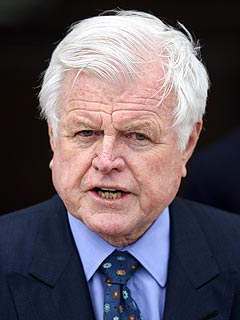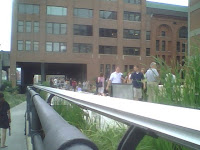Today's broadcast of the NPR show
"On The Media" compiled its recent pieces about the Internet's broad effects on information consumption and society. Inspired by how I thought it affirmed several of my thoughts about how we use the Internet (which is ironic considering how I address below that topic of affirmation), I decided to post an essay I wrote in March for a scholarship application at Cornell. The application's directions were open-ended, so I launched into one of my favorite topics.
For several reasons, I didn't publicize it until now. Consider it my equivalent of the rehashes that all media outlets use through the summer doldrums (not that I'm out of ideas for posts). Oh, and I wasn't awarded the scholarship. Here's the essay:
"The infinite space of the Internet is intimidating. Type a search term into Google and millions of results return in one-tenth of a second. When I write a comment at the bottom of a news story or post a new entry on my blog, I might be planting my rhetorical flag in cyberspace, but I also might be shooting an arrow into the darkness, never to hit a target, never to make an impact.
"The Internet is championed as the great democratization of information. It makes previously unimaginable amounts of content available to everyone. It educates everyone and levels the playing field by making policy, politics, scientific research, financial data and opinion available for all to see. But is there a point where it all becomes too much information?
"As happens with all consumer products, the Internet has intended and unintended effects. In the fields of academics, arts, politics and policy, the Internet exposes people's work to audiences whose size and reach was once thought impossible. For example, it gives unheralded art and its practitioners' careers oxygen they probably deserve. Nonetheless, the effect that troubles me the most is how the Internet fragments thought and community by creating an ever-expanding database of niche publications and discussions that are delicately crafted to find the most specific of demographics. There's something for everyone out there in cyberspace and yet, we only seem to be finding the content that confirms what we already know.
"After a few years working in the journalism business, I can point most readily to the news phenomena the Internet has created. At best, there is Politico, which features excellent reporting and analysis, but rarely pokes its head outside of the "Swamp," aka Washington, D.C., to engage in something broader that resonates with the rest of America. At worst, there are the Huffington Post and the Drudge Report, whose undercurrent of bias is never far from the surface and whose writers never seem terribly interesting in heading to the other side of the partisan field to see if they have anything in common with the other team.
"Content such as these publications only strengthens the echo chamber the Internet was supposed to demolish. It's become quite a cacophonous room at that, considering how there's space for everyone and everything online. Rather than use search engines to find what is new and curious, we settle for what we already know. We nod our heads in affirmation -- 'How could we be so right again and they so wrong?' -- when maybe we should search for something that furrows our eyebrows in puzzlement and provokes thought for the rest of the day.
"Postmodernism, among all its definitions, teachers that there is no omniscient voice and no way to wrap our arms around all of a topic's discourse. The Internet confirms this idea. To yearn for some sort of central repository of thought we can all access via the Internet is outmoded and unproductive. However, the hyper-proliferation of niche sites is also unproductive. In a time where our country's leader and much of the public say they want to embark on an era of post-partisanship, why does so much on the Internet seem to separate us in our preferred corners and cliques?
Terry Teachout, the arts critic for the Wall Street Journal and
Commentary magazine, often writes about how the explosion of cable television and the Internet has eroded culture's middelbrow. Where one was once able to find great art broadcast to the masses, now everyone turns on his own channel, crafted just so, according to his tastes. The same cannot happen when it comes to public discussion. We must push ourselves to remain engaged with everyone on the Internet and avoid using it as a misguided tool that confirms the correctness of our opinions and hardens the divides among communities."





